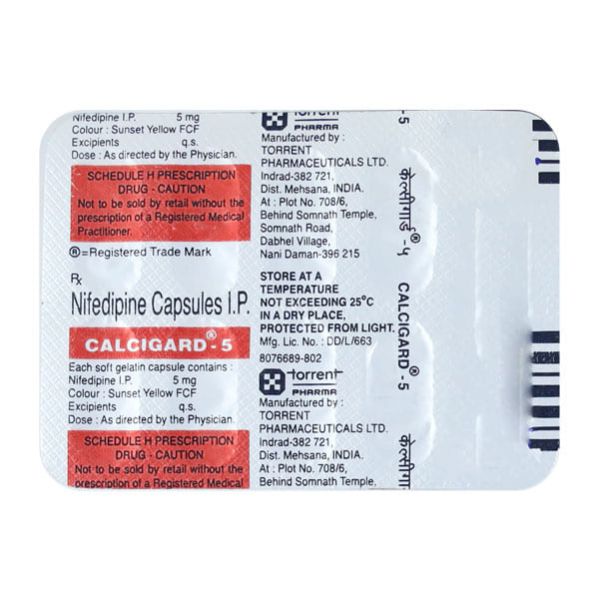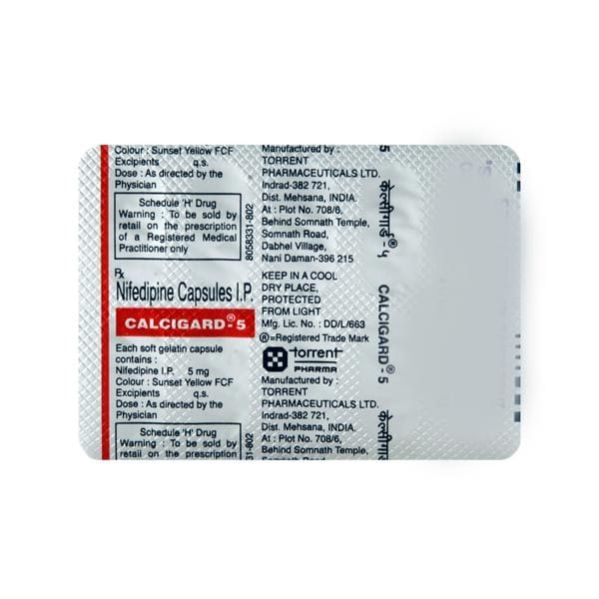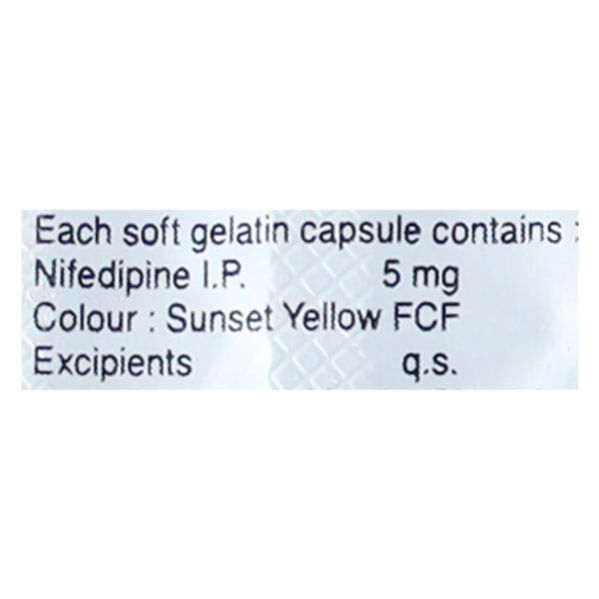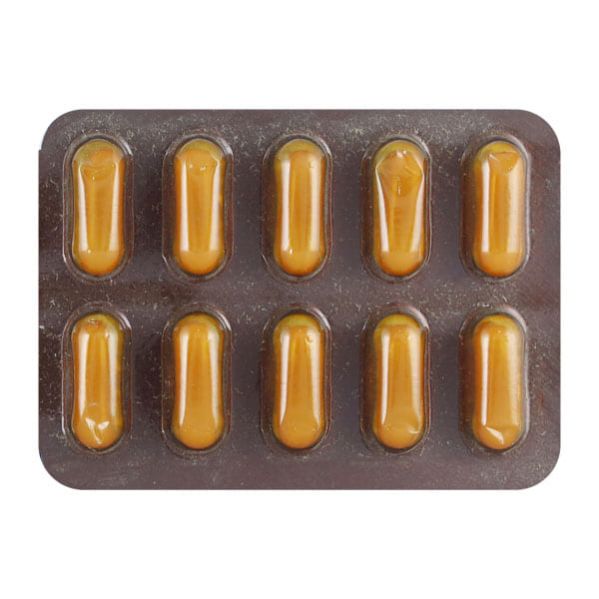Calcigard 5mg Capsule 10'S
Keep CALCIGARD 5MG CAPSULE out of reach from children Store at room temperature
₹ 16.00
₹19
(Inclusive of all taxes)
-

No Warranty
-

COD Avilable
-

Non Returnable
-

cancelable
About this item
INTRODUCTION ABOUT CALCIGARD 5MG CAPSULE
CALCIGARD 5MG CAPSULE contains Nifedipine, which belongs to the group of medicines called Antihypertensive drugs. It is used in the management of high blood pressure (hypertension) and angina. Hypertension is a condition in which the force of the blood against the blood vessel walls is too high and is characterised by headache, irregular heartbeat, vision changes, a feeling of overtiredness, nausea, vomiting, confusion, anxiety, and chest pain. Angina is a type of chest pain caused by reduced blood flow to the heart and characterised by a squeezing type of pain, pressure, heaviness, and tightness in the chest.
CALCIGARD 5MG CAPSULE is not recommended for use in patients with liver and heart disease and should be used with caution with patients having kidney dialysis, improper liver function, or poor cardiac reserve. It should be used with caution in pregnant women, and it is not recommended in a breast-feeding woman; consult your doctor for advice.
CALCIGARD 5MG CAPSULE is not recommended for use by children and adolescents below 18 years of age. The most common side effects of taking CALCIGARD 5MG CAPSULE are headache, flushing, a general feeling of being unwell, constipation, and swelling, particularly of the ankles and legs. Consult your doctor if the symptom worsens.
USES OF CALCIGARD 5MG CAPSULE
- Manage high blood pressure (hypertension) and angina (chest pain)
HOW CALCIGARD 5MG CAPSULE WORKS
CALCIGARD 5MG CAPSULE reduces blood pressure by relaxing and expanding the blood vessels for easy blood flow and thereby lowers the blood pressure, which reduces the strain on the heart. It also works by relaxing and expanding the blood vessels supplying the heart, which allows more blood and oxygen to reach the heart and decreases the strain on it. This reduces the severity and frequency of angina attacks.
DIRECTIONS FOR USE
Take CALCIGARD 5MG CAPSULE as advised by your physician. Swallow this medicine, do not crush, or chew the medicine. Your doctor will decide the correct dose and duration for you depending on your age, body weight and disease condition.
SIDE EFFECTS OF CALCIGARD 5MG CAPSULE
COMMON
- headache
- flushing
- general feeling of being unwell
- constipation
- swelling, especially of legs and ankle
UNCOMMON
- stomach pain
- unspecific pain
- chills
- low blood pressure when standing up showing symptoms of fainting, dizziness, lightheadedness, occasional palpitations, blurred vision, confusion
- fainting
- irregular heartbeat
- dry mouth
- indigestion
- wind (flatulence)
- feeling sick (nausea)
- muscle cramps
- joint swelling
- sleep disorders
- anxiety or nervousness
- reddening of the skin
- nose bleeds
- nasal congestion
- feeling of spinning (vertigo)
- migraine (one side headache)
- dizziness
- trembling (involuntary shaky movements)
- increased urge to urinate
- painful or difficult urination
- erection dysfunction (impotence)
- blurred vision
RARE
- pins and needles feeling
- gum inflammation, with swollen, tender or bleeding gums
Stop taking CALCIGARD 5MG CAPSULE and contact your doctor immediately if you experience any of the following side effects:
- generalised allergic reaction including very rarely life-threatening shock (Ex. difficulty in breathing, drop of blood pressure, fast pulse, swelling including airway
- other allergic reactions like swelling of the skin (sometimes severe which includes swelling of the larynx)
- fast heartbeat (tachycardia)
- shortness of breath or difficulty breathing
- mild to moderate allergic reactions
- itching, a rash or hives
HOW TO MANAGE SIDE EFFECTS
Constipation:
Eat plenty of fiber-rich foods, such as fresh fruits, vegetables, and cereals, and drink plenty of water. Exercise more regularly.
Dizziness
When you feel dizzy, lie down or sit down immediately. If you're experiencing a severe episode of vertigo, lie in a dark, quiet place with your eyes closed. Vehicle driving should be avoided if you experience frequent dizziness without warning. Talk to your doctor if the symptom worsens.
Headache:
Apply a hot or cold-water bag to your head. Try to take a rest in a quiet, dark environment. Drink tea or coffee. Massage with mild pressure on the scalp or head.
Dry mouth:
A dry mouth can be managed by chewing sugar-free gum or sucking on sugar-free hard candies to stimulate the flow of saliva. Drink water at regular intervals. Do not use mouthwashes that contain alcohol because they can be drying.
WARNING & PRECAUTIONS
PREGNANCY
CALCIGARD 5MG CAPSULE should be used with caution during pregnancy but only after special consideration done by your doctor. Consult your doctor before taking CALCIGARD 5MG CAPSULE.
BREASTFEEDING
CALCIGARD 5MG CAPSULE is not recommended for use in breastfeeding women. Consult your doctor for advice before taking [GBNKWYWORD].
DRIVING AND USING MACHINES
Do not drive or operate any machines if you feel dizzy or sleepy, extremely tired, faint, or have visual disturbances after taking CALCIGARD 5MG CAPSULE. Consult your doctor before taking CALCIGARD 5MG CAPSULE.
ALCOHOL
Avoid consuming alcohol as it may cause dizziness, fainting, extreme tiredness, or visual disturbances.
KIDNEY
CALCIGARD 5MG CAPSULE should be taken with caution in patients undergoing kidney dialysis. Consult your doctor before taking CALCIGARD 5MG CAPSULE.
LIVER
CALCIGARD 5MG CAPSULE is not recommended for use in patients with liver disease and should be used with caution when the liver is not working properly. Consult your doctor before taking CALCIGARD 5MG CAPSULE.
ALLERGY
CALCIGARD 5MG CAPSULE is not recommended for use if you are allergic to Nifedipine.
HEART DISEASE
CALCIGARD 5MG CAPSULE is not recommended for use in patients who had a heart attack, unstable angina, sudden angina attack, aortic stenosis (narrowing of the aortic valve) and collapsed because of heart problems (cardiogenic shock). CALCIGARD 5MG CAPSULE should be taken with caution in patients having poor cardiac reserve (the heart cannot cope with increased strain). Consult with your doctor.
OTHERS
CALCIGARD 5MG CAPSULE is not recommended for use if you have:
- inflammation of the bowel or intestines, such as Crohn’s disease
- obstruction or narrowing of intestines
- obstruction in the oesophagus (the tube connecting the throat to the stomach)
- Kock pouch (a surgically constructed intestinal reservoir with an opening through the abdominal wall) in your gut
- malignant hypertension (continuous rise in blood pressure despite management)
Before taking CALCIGARD 5MG CAPSULE, inform your doctor if you have:
- low blood pressure
- diabetic
Use in pediatrics:
CALCIGARD 5MG CAPSULE is not recommended for use in children and adolescents below 18 years of age. Consult your doctor before taking CALCIGARD 5MG CAPSULE.
INTERACTIONS
A. Drug-Drug interactions:
- rifampicin (an antibiotic used to manage bacterial infections like tuberculosis)
- cimetidine (a medicine used to manage stomach ulcers)
- digoxin, diltiazem, quinidine, or beta-blockers like esmolol, and metoprolol (medicines used to manage heart conditions)
- quinupristin/dalfopristin (a combination antibiotic used to manage certain skin infections)
- phenytoin, carbamazepine or valproic acid (medicines used to manage epilepsy)
- cisapride (a medicine used to manage heartburn)
- magnesium sulphate injections during pregnancy (may cause a severe fall in blood pressure)
- erythromycin (a medicine used to manage or manage many infections)
- ketoconazole, itraconazole or fluconazole (medicines used to fungal infections)
- indinavir, nelfinavir, ritonavir, saquinavir or amprenavir (medicines used to manage hiv)
- fluoxetine or nefazodone (medicines used to manage depression)
- tacrolimus (a medicine used to manage the rejection of transplanted organs)
- phenobarbital (a medicine usually used to manage insomnia or anxiety)
B. Drug - Food interaction:
Do not drink grapefruit juice or eat grapefruit while taking CALCIGARD 5MG CAPSULE.
Overdosage:
If you or anyone else accidentally take too much of CALCIGARD 5MG CAPSULE, consult your doctor immediately or visit the nearby hospital. The most common symptoms of overdose are low blood pressure, heartbeats may be increased or slowed down, increased blood sugar level, increased acidity in the blood, swelling in the lungs, low blood oxygen levels and disturbances in consciousness leading to unconsciousness.
SYNOPSIS
| Drug | : | Nifedipine |
| Pharmacological Category | : | Calcium Channel Blockers |
| Therapeutic Indication | : | High Blood Pressure, Angina |
| Dosage Forms | : | Tablet, Capsule |
0 Review Of Product Calcigard 5mg Capsule 10'S
















